Student-led food drive diverts surplus to soup kitchen
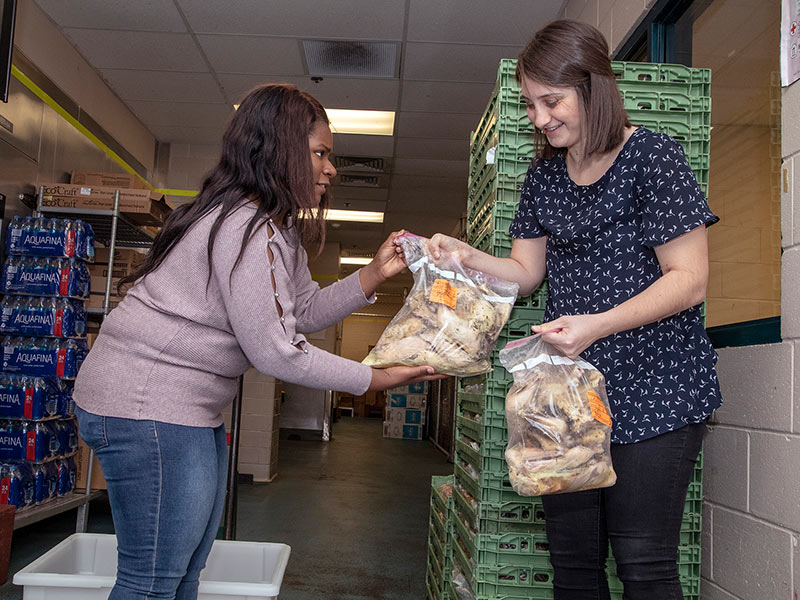
Landfills are emptier and stomachs are fuller, thanks to the dedication of dozens of Medical Center volunteers recruited by second-year medical student Mariam Ebeid.
To put it another way: A funny thing has happened to more than one-and-a-half tons of food on the way to the trash can; they ended up at a soup kitchen instead.
Platefuls of fried chicken, ham, vegetables and more – the University of Mississippi Medical Center’s untouched cafeteria leftovers – have been rerouted by students to the dining tables of the Stewpot Community Kitchen in Jackson, where some 150 to 200 people gather daily for their noontime meal.
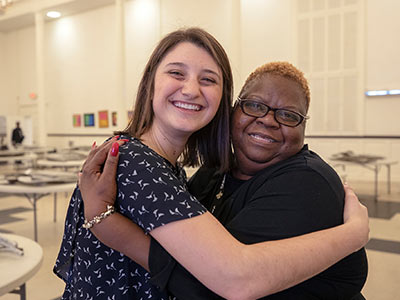
“I love them so much,” said Theresa Earnest, Stewpot’s kitchen manager, referring to the student crew. “We don’t usually have a lot of different kinds of meat here, but they come through for me every time.
“They’re so sweet. I thank them for everything they do.”
For her part, Ebeid said the food collected over the past several months may “be a tiny drop in the bucket, but it’s one thing we can do to help. This also serves as kind of a gateway between the Medical Center and community right around us.
“A lot of people who eat at Stewpot may not have access to healthy food, and what we collect would normally go in the trash.”
One way to get between the Medical Center and the garbage trucks, Ebeid discovered, is through the guidance and resources of the Food Recovery Network , “the largest student movement fighting food waste and hunger in America,” as its website claims.
Since 2011, more than three million pounds of food have been reclaimed through the national organization’s 230 chapters, which include the one Ebeid got going at UMMC with faculty advisor Dr. Alan Penman, professor of preventive medicine.
Here, about 50 volunteers are taking part, many from the School of Medicine, but also several from other schools, including Graduate Studies and Health Related Professions.
With the help and encouragement of Dr. Tammy Dempsey, UMMC director of community engagement and service learning, the food rescuers signed up through a platform that gives students and employees opportunities to help nonprofits: GiveGab.
“Putting it in GiveGab opens it up to the entire student body,” Dempsey said. “We are hopeful this will build interest amongst other students and result in [the Associated Student Body] and school philanthropy chairs continuing to lead in these efforts – long after Mariam is Dr. Ebeid.”
Ebeid was an undergraduate at Rhodes College in Memphis when a friend of hers started a Food Recovery Network chapter there. Because it speaks to food waste and hunger in America, this commitment had a profound attraction for Ebeid, whose social conscience was pierced as well by the Anthony Bourdain-produced documentary, "Wasted."
When she became the community service co-chair for her medical school class, Ebeid did not have to look far for a mission to embrace.
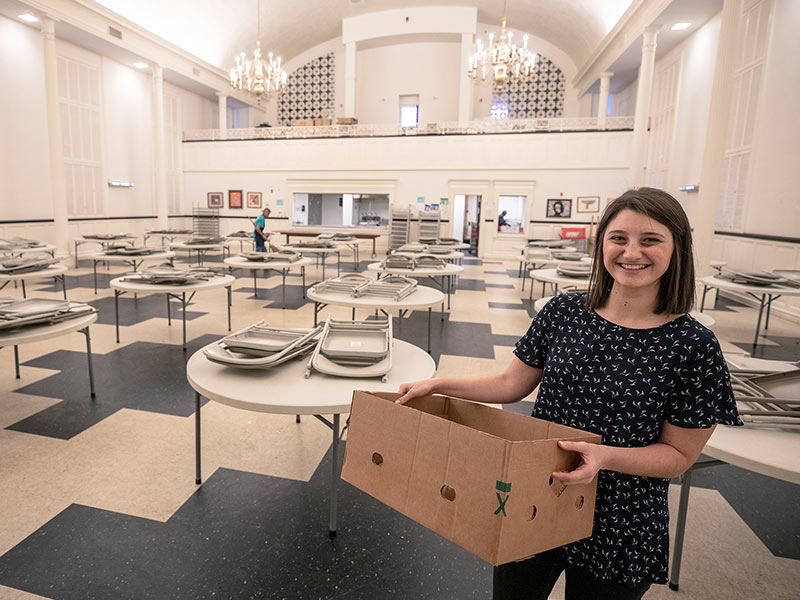
It has required, of course, the cooperation of the cafeteria – that is, the staff, who serve and prepare 1.5 million meals a year among the campus’ three main dining halls; that’s the equivalent of, on average, 1,312,000 pounds of food each year, said Tim Liskey, food services director.
“The employees have a sense of pride about doing something for the local community, especially the employees who live here in Jackson,” said Chef Richard Curtis, who, along with Liskey, are UMMC contractors through their employer, Morrison Healthcare.
“There’s been a real buy-in from our team members, who now think in terms of donating, instead of throwing away something we could no longer use.
“We have very strict guidelines for what we can and can’t serve our patient population.” The latter could mean cooked, but too-soft, vegetables more suitable for soup. It could mean an overabundance of fried chicken, for instance, or leftover salmon which could be reincarnated as croquettes.
“We give everybody who eats at the cafeterias a fresh product, so we can’t reuse the food here,” Curtis said. “We are allowed to keep food in-house for no more than two days.”
That’s a restriction handed down by Morrison’s parent company, Compass One Healthcare, which “does a lot of work with second-harvest food banks,” Curtis said.
“Before we set the food aside in Ziploc bags for the students to pick up, I inspect it to make sure it’s wholesome and in good shape.”
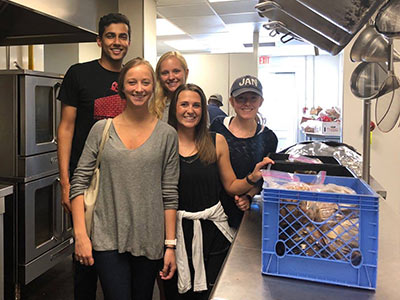
Operating from a sign-up schedule, Ebeid and other students are now picking up the Stewpot-bound meals from the main cafeteria loading dock two days a week: Tuesdays and Fridays.
“Anything we can do to help Stewpot and the community is a good cause,” said Jasmine Ware of Tupelo, a graduate student in biomedical sciences, who was recruited by fellow grad student Simmi Pal of Clinton.
“Instead of wasting food, you bring it here,” said Ware, standing in the Stewpot’s West Capitol Street parking lot on a chilly December afternoon just after a drop-off.
Before delivering it, though, Ebeid weighs it on her scale – a routine she began around May of last year, a couple of months after the collections commenced. As of late December, the total take weighed in at around 2,800 pounds, but, if you throw in those “missing” months, it may be closer to 3,500, Ebeid estimated.
Within that total are about 100 pounds of cookies and other sweets liberated for Stewpot from Campbell’s Bakery in Jackson.
“We call the students whenever we have something ready to donate,” said Kaley Farris, a customer service representative at Campbell’s. “Mariam is great. She even came by one day in the pouring rain with an injured ankle – she was wearing a boot on it.
“She’s amazing. I like calling her just so I can see her that day.”
While the volunteers’ partnership with the cafeteria is unique at the Medical Center, at least within recent memory, their impulse is not. Among UMMC students, faculty and staff, there is a tradition of service devoted to keeping people fed.
Students studying occupational therapy and physical therapy cook and deliver meals for families who stay at the Ronald McDonald House during their children’s long-term medical care.
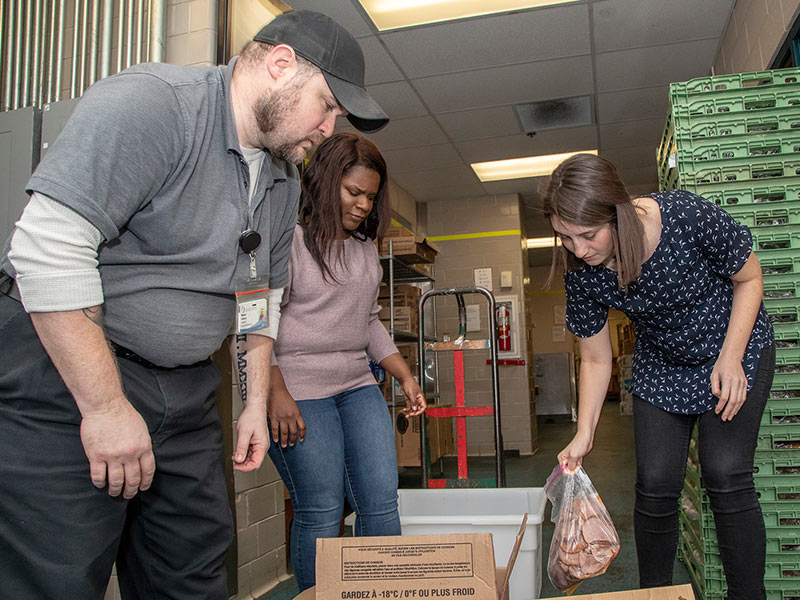
Dr. Bettina Beech, dean of the John D. Bower School of Population Health, and Dr. Josie Bidwell, associate professor of preventive medicine, serve on the board of the Mississippi Food Network, which distributes donated food and groceries through hundreds of agencies.
Beech is also the executive director of the Myrlie Evers-Williams Institute for the Elimination of Health Disparities, which, through its EversCare Clinic, will operate an emergency food pantry with the Mississippi Urban League starting in February.
The food, provided by the Mississippi Food Network, “will be available for any of our patients and others in the community who are food insecure,” said Victoria Gholar, EversCare’s clinical director.
Bidwell, a lifestyle medicine nurse practitioner, is a board member as well for the Good Samaritan Center, the provider of meals and other services to families in crisis.
Another UMMC faculty member, Dr. Caroline Compretta, an assistant professor with appointments in the departments of Preventive Medicine and Pediatrics, and in the Center for Bioethics and Medical Humanities, is on Stewpot’s board of directors.
Dr. Gregory Chinchar, professor of microbiology and immunology, pitches in on behalf of Gleaners Inc., a decades-old organization that salvages and donates provisions for a variety of charities, such as Stewpot.
“Last year, Gleaners collected more than one million pounds of food,” Chinchar said. Several years ago, a number of students from UMMC joined Gleaners’ ranks on Saturday mornings, and “we would welcome them again,” he said.
Ad hoc efforts by other students, notably those in the School of Nursing, have also eased the hunger of Mississippians in need.
Obviously, there’s still a lot of work to go around – the kind that should hit home with those who occupy the classrooms, offices and clinics of the Medical Center, Ebeid said.
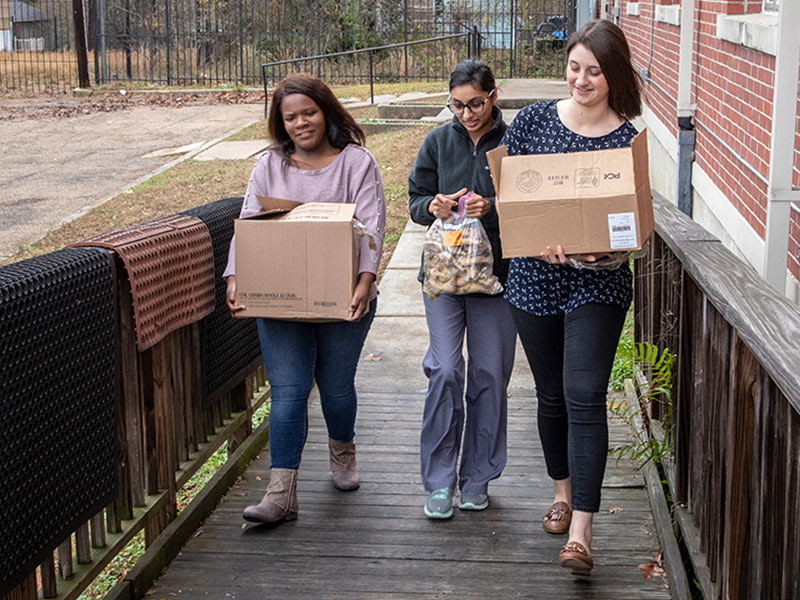
Social accountability is a target for academic medical centers, and in Mississippi, there are many opportunities to practice it: More than 600,000 people – one in five – struggle with hunger, reports Feeding America, a national group of food banks and pantries.
Among those Mississippians are more than 176,000 children who have incomplete or tentative access to enough food to live healthy lives.
“I believe it’s important for us in health care to see the effects of food waste and hunger outside the place we study and work,” Ebeid said. “Often, it's hunger or lack of access to healthy food that sends people to the hospital.”
For her, it comes down to the question she and many of her fellow students are trying their best to answer: “‘What are you going to do about it?’”
--------
For more information, contact Mariam Ebeid at mebeid2@umc.edu; or, to sign up online, go here.

